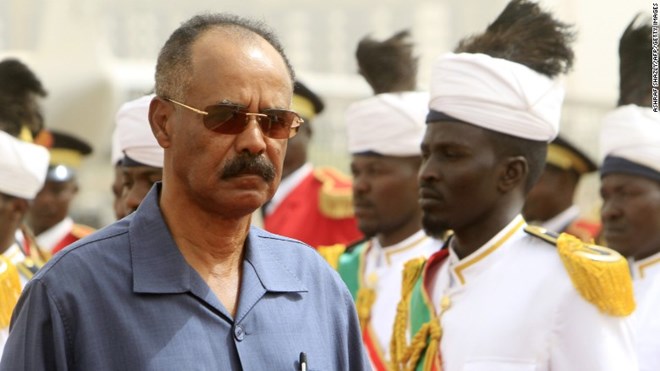
Friday June 14, 2019
By Bukola Adebayo, CNN

Eritrean President Isaias Afwerki (L) has been in power since 1993.
(CNN)A social media movement created to expose Eritrea's closed regime is gaining momentum.
Driven by young Eritreans living in the United States, UK, and Europe, the 'yiakl' campaign, which means enough, is calling for an end to what they say is a repressive regime in their home country.
The people in the movement are seeking the ouster of the country's longtime President Isaias Afwerki and supporters hope it can morph into the type of people-led movement that toppled Omar al-Bashir's 30-year rule in Sudan.
Modeled on the viral ice-bucket challenge, people involved in the social media campaign are nominating others to take part. But instead of dousing themselves in ice cold water, the Eritreans are instead sharing videos speaking out against the President.
Swedish-Eritrean activist Vanessa Tsehaye told CNN: "The #yiakl campaign gathers the frustration amongst Eritreans and shares it with the world in an attempt to mobilize people and put pressure on the Eritrean regime."
Many people have backed the movement, often speaking in their native Eritrean languages in videos that describe the conditions in a country often called the "North Korea of Africa."
Some, however, have criticized the campaign for coming at the same time as the Sudan crisis where hundreds have been killed in massive protests.
Afwerki took power in Eritrea in 1993, becoming the country's first president. No elections have been held since then.
There is no freedom of the press, critics of the regime have been jailed, and others have disappeared from public view for years, according to reports compiled by Human Rights Watch agency.
Eritreans who want to leave the country must get an exit visa issued by the government.
Under Afwerki's regime, citizens are enlisted in national military service that's supposed to last 18 months, but can last indefinitely.
Tens of thousands have fled the country by traveling treacherous migration routes to escape the forced conscription.
Many Eritreans living abroad shared tales on social media of their time in the military camps, known as Sawa, with one describing it as "a horror."
Critics jailed, forced migration
In an open letter to President Afwerki this week, 100 African activists said they were concerned about the fate of imprisoned journalists and activists in Eritrean prisons.
They asked that they be allowed to visit those that were jailed.
The activists including Noble Laureate winner Prof. Wole Soyinka and Ugandan opposition leader and pop star Bobi Wine said Eritrea has been described as the "most closed society" in Africa.
"Over the past two decades, Eritrea has been described as the most closed society on our continent, an unfortunate situation for a country with such rich human capital and potential, with so much to offer not only Africa but also the world," the letter reads.
They hailed the President for repairing the country's frosty relationship with neighboring Ethiopia, saying a similar gesture is needed to end "Eritrea's isolation from the larger African family."
The Eritrean government slammed the group in a terse statement on Thursday, saying it had chosen an "inappropriate medium of communication."
Eritrea has witnessed six decades of war, and the government was now committed to a peaceful resolution, the Ministry of Information said in response, adding that officials would not be distracted by external attempts to isolate the country, .
"None of them have firsthand knowledge of or have ever visited, the country. When one skims through the list, there is not even a single individual who had penned one single article on the predicaments of Eritrea in all those decades when it faced enormous existential threats," the statement read.
The release alluded that the group of influential activists was working for "external powers," which have been known to use "African voices" to promote division in the nation.
"One wonders whether a similar gimmick is on the offing in this case, too. Particularly as some of the individuals in the list have murky associations with certain powers," the statement read, adding that the activists were welcome to visit the country.
"Eritrea's motto has been, 'Come and See,' Eritrea is open to all those with genuine interest in understanding the country, its people, and its leadership. Otherwise, Eritrea's "rightful place in the family of African nations," achieved and preserved through the blood, sweat and sacrifice of her children, remains intact," the statement continues.
Hope for reform?
Former enemies Ethiopia and Eritrea declared an end to a conflict last year that claimed the lives of 70,000 people.
Diplomatic missions on both divides had been closed, and communication lines shut down during the border war, which was fought from 1998 to 2000.
Many hoped the decision would open up the country, often described as the "North Korea of Africa," and its people to the world. However, that change has been slow in coming.
The government still restricts internet access, and World Bank figures show that only 1.3 percent of Eritreans are currently online.
Tsehaye, who founded a youth-led organization demanding the release of political prisoners in Eritrea, says time is up for the Afwerki's government.
"We are saying enough to the dictatorship, enough to our people's suffering and enough to the silence. The Eritrean people deserve better," she said.